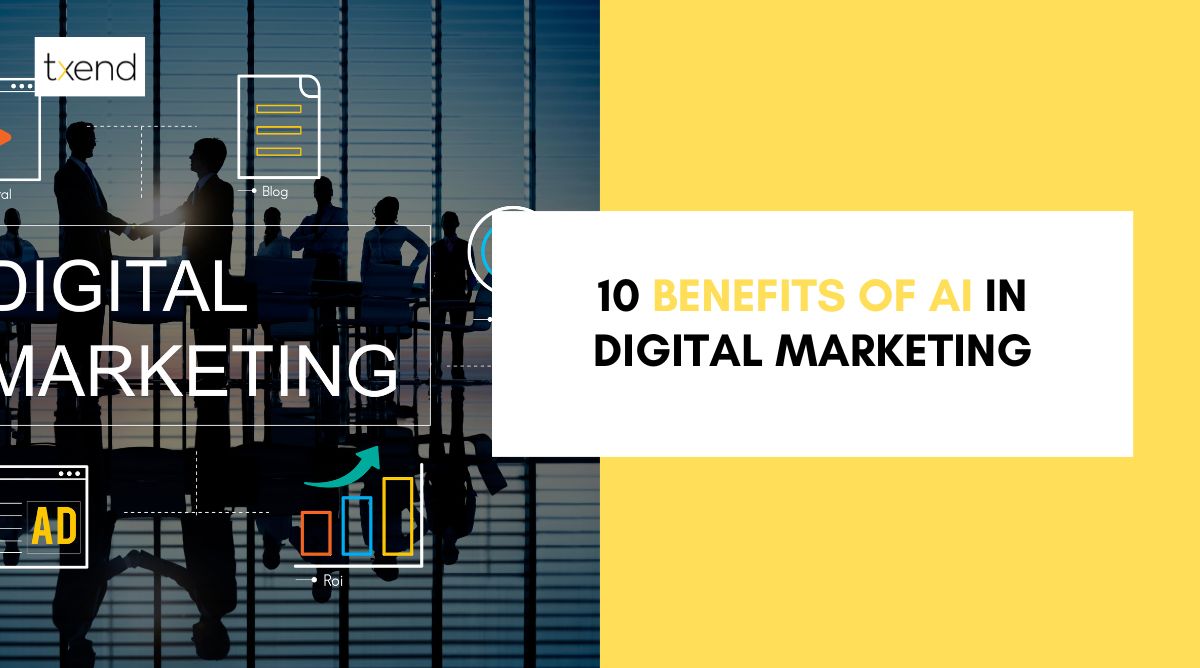
In the ever-evolving landscape of digital marketing, the integration of artificial intelligence (AI) has emerged as a game-changing phenomenon. As businesses seek to stay ahead of the competition, AI has proven itself to be an invaluable ally, offering a wealth of advantages that can significantly enhance marketing strategies.
From improving customer engagement and personalization to optimizing campaign performance and efficiency, the benefits of AI in digital marketing are both diverse and profound.
In this article, we embark on a journey to explore the transformative & potential benefits of AI in digital marketing. We delve into the core principles of AI marketing and uncover how it’s reshaping the way brands connect with their audiences.
Whether you’re a seasoned marketer looking to stay at the forefront of the industry or just beginning to navigate the digital marketing landscape, this comprehensive exploration of the benefits of AI in digital marketing will provide you with valuable insights and strategies to harness the power of AI effectively.
Join us as we unravel the myriad advantages that AI brings to the world of digital marketing, and discover how it can elevate your marketing efforts to new heights.
What Is Digital Marketing?
The practise of promoting and advertising goods, services, or brands through a variety of online platforms and technologies is known as “digital marketing” both domestically and internationally. In order to connect with target audiences through digital and online media, it encompasses a wide range of strategies and tactics.
In the United States, digital marketing has become an integral part of the business landscape due to the country’s extensive internet penetration and the widespread use of digital devices.
It has significantly transformed the way companies engage with consumers and how consumers discover, evaluate, and purchase products and services.
Key components of digital marketing in the United States include:
Search Engine Optimization (SEO):
This strategy involves optimizing website content to rank higher in search engine results pages (SERPs). It’s crucial for improving a website’s visibility and attracting organic traffic.
Content Marketing:
generating and disseminating worthwhile and pertinent content in order to draw in and involve the intended audience. This could include articles, videos, blog entries, and more.
Social Media Marketing:
Leveraging platforms like Facebook, Twitter, Instagram, and LinkedIn to build a brand’s online presence, interact with customers, and run targeted ad campaigns.
Email Marketing:
Sending personalized messages and offers to subscribers’ email inboxes to nurture leads and retain customers.
Pay-Per-Click (PPC) Advertising:
running sponsored advertisements on websites such as Google Ads and Bing Ads, in which sponsors pay when users click on their ads.
Influencer Marketing:
working together to promote goods and services to celebrities and influencers on social media.
Affiliate Marketing:
collaborating on product promotion with people or other companies in order to get paid a commission for sales brought about by their efforts.
Analytics and Data Analysis:
Utilizing tools and data analysis to measure and optimize the effectiveness of marketing campaigns, allowing businesses to make data-driven decisions.
The United States, as a leader in technology and digital innovation, is home to a thriving digital marketing industry. Businesses across various sectors rely on digital marketing strategies to reach their target audience, drive sales, and build brand loyalty.
Success in this dynamic and constantly changing field depends on keeping up with the newest trends and technological advancements.
How is AI being used in digital marketing today?
In the United States, artificial intelligence (AI) has rapidly become an indispensable tool in the field of digital marketing, revolutionizing the way businesses connect with their target audiences, make data-driven decisions, and optimize their marketing strategies.
AI is being harnessed across various aspects of digital marketing to enhance efficiency, personalization, and overall effectiveness. Here are some key ways in which AI is being used in digital marketing today:
Personalized Content Recommendations:
User behavior and preferences are analyzed by AI algorithms to provide personalized content recommendations.
Whether it’s suggesting products, articles, or videos, AI helps increase user engagement and conversion rates.
Chatbots and Customer Service:
AI-powered chatbots provide instant responses to customer queries, improving customer service and engagement. They can handle routine inquiries, schedule appointments, and even assist in the purchase process.
Predictive Analytics:
AI tools use data analysis to predict customer behavior, trends, and potential outcomes. Marketers can make informed decisions based on these predictions, optimizing their strategies for better results.
Email Marketing Automation:
AI enables the creation of highly personalized email campaigns. It can segment email lists, recommend products, and send messages at the most optimal times to maximize open and click-through rates.
Content Creation:
AI-generated content, such as articles, product descriptions, and social media posts, is increasingly used to streamline content production. This not only saves time but can also maintain quality and consistency.
Ad Targeting And Optimization:
AI enhances the precision of ad targeting by analyzing user data and behavior. It can adjust bidding strategies, allocate budgets, and choose the most effective ad creatives in real-time to maximize return on ad spend (ROAS).
Search Engine Optimization (SEO):
AI helps in on-page and off-page SEO by analyzing content, suggesting keywords, and optimizing websites for search engines. Voice search optimization is also gaining importance with AI.
Social Media Insights:
AI tools can provide in-depth social media analytics, helping marketers understand audience sentiment, track trends, and plan content accordingly.
Marketing Automation:
AI-driven marketing automation platforms can manage multi-channel campaigns, lead nurturing, and customer journey mapping, making marketing efforts more efficient.
Data Analysis And Reporting:
AI simplifies the process of collecting and analyzing large sets of data, offering insights into campaign performance, user behavior, and conversion rates.
The United States, a pioneer in technology innovation, has seen a broad use of artificial intelligence (AI) in digital marketing.
AI is being used by businesses in a variety of sectors to increase ROI, enhance customer experiences, and obtain a competitive edge. It is anticipated that as AI develops further, it will play a bigger part in digital marketing, increasing the effectiveness and customization of marketing campaigns.
Significance of AI in Enhancing Customer Engagement
In the US, artificial intelligence (AI) is becoming a major factor in changing how consumers interact with brands. AI is essential to improving and personalizing consumer interactions in a time when Businesses are constantly searching for fresh and imaginative approaches to with their audience.
One of the primary ways AI enhances customer engagement is through its ability to analyze and interpret vast amounts of data.
By gathering and processing information on customer preferences, behaviors, and demographics, AI enables businesses to create highly personalized experiences. AI can, for example, make product recommendations to customers when they shop online based on their browsing or past purchases, which increases the chance of a sale.
Additionally, chatbots and virtual assistants powered by AI are now a necessary part of customer service. They respond to questions instantly and provide solutions all day long. In addition to raising customer satisfaction, this reduces costs by allocating human resources to more difficult jobs.
In the realm of marketing, AI can segment audiences effectively, allowing businesses to tailor their messages to specific demographics. This level of personalization increases the content, resulting in increased rates of engagement and conversion.
Voice assistants, like those found in smart speakers and mobile devices, have become increasingly prevalent in the lives of consumers. AI-driven voice technology has opened up new channels for engagement, allowing users to interact with brands through voice commands.
This trend is transforming the way businesses deliver information and services, creating more intuitive and convenient customer experiences.
AI’s predictive capabilities are another aspect of its significance. By analyzing past behavior and current data, AI can forecast customer needs and preferences, enabling businesses to proactively offer products or services. This proactive approach can boost customer loyalty and brand trust.
In summary, the significance of AI in enhancing customer engagement in the United States cannot be overstated.
From personalized marketing and round-the-clock support to data-driven insights and predictive capabilities, AI empowers businesses to connect with their audience in more meaningful and efficient ways. As AI technology continues to advance, its role in customer engagement is poised to expand, driving a new era of customer-centric strategies and experiences.
10 Benefits of Using AI in Digital Marketing
In the United States, the incorporation of Artificial Intelligence (AI) into digital marketing strategies has brought about a multitude of benefits that are changing how companies interact with their customers and drive results.
Here are ten key advantages of using AI in digital marketing in the US:
Enhanced Personalization:
Large volumes of data are analyzed by AI algorithms to deliver highly personalized content and product recommendations, increasing user engagement and conversion rates.
Improved Customer Segmentation:
AI helps businesses categorize their audience into precise segments, allowing for more targeted and effective marketing campaigns.
Real-time Data Analysis:
AI processes data in real time, enabling businesses to respond swiftly to changing market trends and consumer behaviors.
Optimized Ad Campaigns:
AI-driven tools refine ad targeting, bid management, and ad creatives, maximizing return on ad spend (ROAS and ad campaign effectiveness.
Chatbots for 24/7 Support:
AI-powered chatbots provide round-the-clock customer support, improving user experiences and reducing the workload on human customer service representatives.
Content Generation:
AI can generate high-quality content, saving time and effort for content marketers and ensuring a consistent flow of material.
Voice Search Optimization:
With the rise of voice-activated devices, AI helps businesses optimize content for voice search, ensuring visibility in voice search results.
Predictive Analytics:
AI algorithms forecast customer behaviors and trends, enabling businesses to anticipate and meet customer needs more effectively.
Marketing Automation:
AI-powered marketing automation streamlines the management of multi-channel campaigns, simplifying tasks like lead nurturing and email marketing.
Data Security and Fraud Detection:
AI systems play a vital role in protecting customer data by detecting and preventing fraud, ensuring a secure environment for online transactions.
These ten benefits collectively highlight the transformative power of AI in digital marketing in the United States. By leveraging AI technologies, businesses can optimize their strategies, improve customer engagement, and stay competitive in the ever-evolving digital landscape.
AI is predicted to play an even more significant role in digital marketing as it develops, influencing how marketing is done in the US going forward.
Examples of Using AI in Digital Marketing
Content Recommendation Engines:
AI algorithms are used by major streaming services like Netflix and Amazon Prime Video to examine the viewing preferences and habits of their users. This data is then used to recommend personalized content to viewers, enhancing their user experience and keeping them engaged.
Chatbots and Virtual Assistants:
Many U.S. companies have integrated chatbots and virtual assistants into their websites and customer service platforms.
These AI-powered chatbots can handle customer inquiries, schedule appointments, and even process orders, providing immediate and efficient assistance.
Social Media Advertising:
AI is used for ad targeting on social media sites like Facebook and Instagram. Advertisers can designate particular audiences to target based on their interests, behaviors, and demographics, and the AI algorithms make sure that the right people see their ads.
Email Marketing Personalization:
E-commerce companies in the U.S. use AI to create highly personalized email marketing campaigns. AI can segment the email list, analyze user behavior, and tailor content and product recommendations, resulting in higher open and click-through rates.
Predictive Analytics:
E-commerce businesses and retail companies use AI to predict customer behavior and trends. By analyzing historical data, AI algorithms can forecast what products customers are likely to purchase next, allowing companies to stock inventory accordingly.
Voice Search Optimization:
AI-driven voice technology has gained prominence with the rise of voice-activated devices like Amazon’s Alexa and Apple’s Siri. U.S. companies optimize their online content to be voice-search-friendly, ensuring that their products and services are discoverable through voice searches.
Dynamic Pricing:
Airlines, hotels, and e-commerce platforms in the U.S. use AI to dynamically adjust prices based on demand, competitor pricing, and other factors. This pricing strategy optimizes revenue while remaining competitive.
Search Engine Optimization (SEO):
SEO tools powered by AI help websites rank higher in search engine results by analyzing user intent, keyword trends, and content relevance. This ensures that businesses can attract organic traffic effectively.
Content Generation:
Many companies use AI-generated content to produce social media updates, blog posts, and product descriptions. This not only saves time but also maintains content quality and consistency.
Data Analysis and Reporting:
These illustrations show the variety of ways AI is significantly influencing digital marketing in the US. AI tools help marketers measure the performance of their campaigns, track user behavior, and adjust strategies based on real-time data insights.
These examples illustrate the diverse ways in which AI is making a significant impact on digital marketing in the United States. AI’s ability to analyze data, personalize content, and optimize marketing strategies is transforming how businesses engage with their audiences and drive better results in the digital marketing landscape.
Tips For Getting Started With AI In Digital Marketing
Define Your Goals And Objectives:
Prior to utilising AI for digital marketing, make sure your objectives are clear. Are you trying to improve customer engagement, streamline your marketing procedures, increase website traffic, or increase conversions? Your AI implementation approach will be guided by the goals you have set.
Understand Your Target Audience:
AI’s effectiveness in digital marketing relies on understanding your target audience. Utilize AI tools to gather and analyze data about your audience’s demographics, behavior, and preferences. This data will help you tailor your campaigns to resonate with your audience.
Choose The Right AI Tools:
Research and select the AI tools or platforms that align with your digital marketing needs. There are various AI solutions available, from chatbots and recommendation engines to analytics platforms and automation tools. Ensure the chosen tools match your objectives.
Integrate AI With Your Existing Systems:
Implementing AI should complement your existing digital marketing systems. Ensure a smooth integration process to avoid disruption and maximize the benefits of AI.
Data Collection And Management:
High-quality data is essential for AI to work effectively. Establish data collection and management processes to ensure accuracy and compliance with data privacy regulations such as GDPR in the United States.
Content Personalization:
Leverage AI to personalize your content. Create customized product recommendations, email campaigns, and website content based on user behavior and preferences.
Start With Small-Scale Projects:
If you’re new to AI in digital marketing, begin with small-scale projects. For example, use AI to optimize email subject lines for higher open rates or run A/B tests with AI-generated content to understand its impact.
Continuous Learning:
AI systems are dynamic, so make continual learning investments. Keep up with the most recent advancements in digital marketing strategies and AI trends and technologies.
A/B Testing and Optimization:
Continuously test AI-driven strategies and campaigns. A/B testing allows you to compare AI-optimized content or strategies with traditional methods to gauge their effectiveness.
Data Security And Compliance:
Be aware of data security and compliance regulations in the United States. Ensure that your use of AI respects privacy laws and that user data is handled securely.
Measure And Analyze Results:
Use AI-driven analytics to measure the performance of your digital marketing efforts. AI can provide real-time insights, allowing you to adjust your strategies for better results.
Training And Education:
Invest in training and educating your marketing team. Understanding how AI works and its potential can help your team harness its power effectively.
By following these tips, businesses in the United States can begin their journey into AI-powered digital marketing with a solid foundation, maximizing the benefits and staying competitive in the ever-evolving digital landscape.
Implementing AI Strategies In Digital Marketing
Key Steps To Integrate AI Into Existing Marketing Frameworks:
Integrating AI into existing marketing frameworks involves a systematic approach to incorporating artificial intelligence into your current marketing practices.
Key steps include data assessment and collection, selecting the right AI tools or platforms, ensuring data privacy and compliance, and establishing clear goals for AI implementation.
This process helps organizations effectively harness the power of AI to achieve their marketing objectives while maintaining consistency with their existing strategies.
Best Practices for Harnessing the Full Potential of AI Marketing:
To harness the full potential of AI marketing in the US, businesses should follow best practices that include defining clear objectives, understanding the audience, and continuously optimizing strategies based on AI-driven insights.
These best practices encompass creating highly personalized content, running data-driven campaigns, and leveraging AI-powered analytics. They enable companies to maximize the benefits of AI marketing and remain competitive in the rapidly evolving digital marketing landscape.
Overcoming Challenges: Addressing Concerns And Misconceptions About AI Implementation:
The integration of AI into marketing is not without its challenges, and addressing concerns and misconceptions is vital. Common concerns include data privacy, security, and the fear of job displacement due to automation.
Overcoming these challenges involves educating stakeholders, implementing strong data protection measures, and demonstrating how AI can enhance rather than replace human roles. In the US, organizations must address these concerns to gain trust and ensure successful AI implementation in digital marketing.
Why Businesses Must Embrace AI to Stay Competitive?
In the ever-evolving landscape of digital marketing in the United States, the need for businesses to embrace AI technologies is becoming increasingly imperative to maintain a competitive edge.
AI, with its transformative capabilities, is reshaping the way companies connect with their target audience, optimize marketing strategies, and enhance customer experiences.
AI-driven tools and strategies have demonstrated their effectiveness in achieving superior results. From personalizing content and recommendations to improving the precision of ad targeting and automating marketing tasks, the advantages of AI in digital marketing are numerous.
Here’s why businesses must wholeheartedly embrace AI to stay competitive:
Enhanced Customer Engagement:
AI enables businesses to engage with customers on a highly personalized level, delivering tailored content, product recommendations, and responsive customer support.
Data-Driven Decision Making:
Through real-time analysis of massive datasets, artificial intelligence (AI) offers insightful information that enables businesses to quickly and decisively make strategic adjustments.
Efficiency and Automation:
By automating repetitive tasks, artificial intelligence (AI) optimizes marketing processes and frees up resources for more innovative and strategic projects.
Competitive Edge:
Employing AI allows businesses to stay ahead of the curve in technology and create more effective and relevant marketing campaigns than their rivals.
Improved ROI:
AI optimizes ad targeting, ensuring that marketing budgets are allocated effectively, resulting in a higher return on investment.
Adaptation to Trends:
AI helps companies adapt to changing market trends and consumer behaviors, ensuring they remain agile and responsive to the evolving digital landscape.
Enhanced Customer Experience:
AI enhances the customer journey with personalized recommendations and instant support, fostering brand loyalty and trust.
Predictive Capabilities:
AI algorithms can forecast future customer behavior and trends, allowing businesses to proactively meet customer needs.
Efficient Content Creation:
AI-driven content generation tools save time and resources while maintaining content quality and consistency.
Data Security and Compliance:
AI aids in safeguarding customer data, detecting and preventing fraud, and ensuring data privacy compliance.
To remain competitive in the United States’ digital marketing arena, businesses must recognize that AI is not just a luxury but a necessity. Embracing AI technologies and strategies is essential to deliver the tailored experiences that modern consumers demand and to achieve optimal marketing results in a rapidly evolving digital landscape.
- Vivamus starlord finibus, dictum massa eget suscipit metus nami
- Cras ipsum libero, suscipit vitamin tellus vitae, feugiat ultricies purus
- Morbi maximus mauris eget groot dignissim, in laoreet justo facilisis
- Cras ipsum libero, suscipit vitamin tellus vitae, feugiat ultricies purus
- Vivamus starlord finibus, dictum massa eget suscipit metus nami
- Morbi maximus mauris eget groot dignissim, in laoreet justo facilisis
The benefits of AI in digital marketing include improved personalization, enhanced efficiency, data-driven insights, and increased customer engagement.
AI in digital marketing is used to enhance personalization, improve data analysis, automate tasks, and optimize marketing strategies for more effective and efficient customer engagement.
Artificial intelligence enhances personalization, efficiency, and data-driven decision-making in digital marketing.
Artificial intelligence enhances personalization, efficiency, and data-driven decision-making in digital marketing.
Conclusion:
In conclusion, the benefits of AI in digital marketing are not merely theoretical but have become a transformative reality in the United States and across the globe.
AI marketing tools and strategies have revolutionized the way businesses connect with their audiences, optimize campaigns, and provide highly personalized experiences.
As we’ve explored, the advantages of AI in digital marketing are multifaceted, encompassing enhanced customer engagement, data-driven decision-making, streamlined automation, improved ROI, and much more.
One cannot stress how important it is for companies to adopt AI technology in order to stay competitive in the ever-changing digital landscape.
By incorporating AI into their marketing efforts, companies can not only stay ahead of the curve but also deliver the tailored experiences that modern consumers expect.
Through the integration of AI in their marketing strategies, businesses can maintain a competitive edge and provide the customized experiences that contemporary customers demand.



